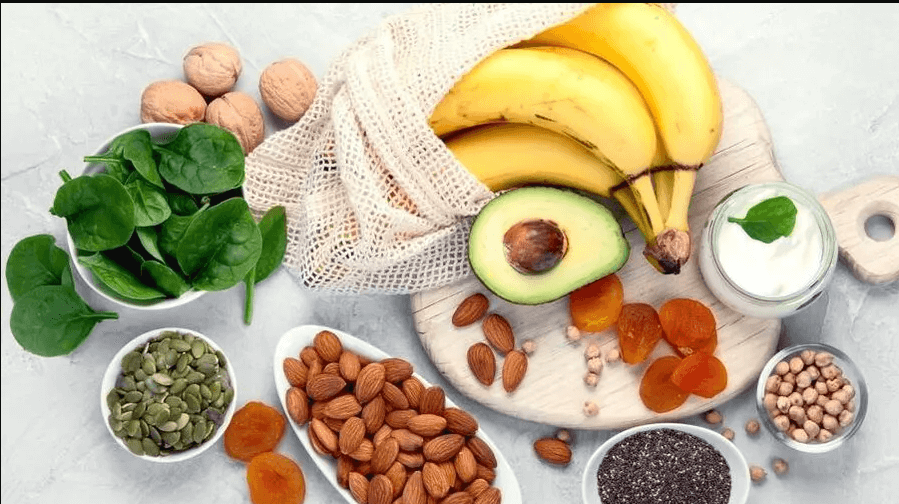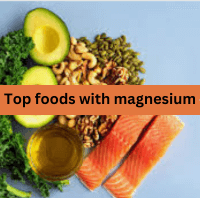Table of Contents
Top12 Foods Highly Rich in Magnesium

Magnesium is an essential mineral that plays a crucial role in over 300 biochemical reactions in the body., Top foods with magnesium, It supports muscle and nerve function, regulates blood pressure, and helps build strong bones. Despite its importance, many people don’t get enough magnesium in their diets. Incorporating magnesium-rich foods into your meals is a simple way to ensure you’re meeting your daily needs. Here are 12 foods that are highly rich in magnesium and can help boost your overall health.
- Spinach
Spinach is one of the most nutrient-dense leafy greens, packed with a variety of vitamins and minerals, including magnesium. Just one cup of cooked spinach provides about 157 mg of magnesium, which is nearly 40% of the daily recommended intake.
- Almonds
Almonds are not only a convenient snack but also a great source of magnesium. A 1-ounce serving (about 23 almonds) contains approximately 80 mg of magnesium. They’re also rich in healthy fats and protein, making them a perfect addition to your diet.
- Avocado
Avocados are famous for their creamy texture and health benefits. One medium avocado provides around 58 mg of magnesium, along with potassium, healthy fats, and fiber. Adding avocado to your meals can help boost your magnesium intake while providing numerous other nutrients.
- Dark Chocolate
Good news for chocolate lovers: dark chocolate is rich in magnesium. One ounce of dark chocolate (70-85% cocoa) offers about 64 mg of magnesium. In addition to magnesium, dark chocolate is loaded with antioxidants that can improve heart health.
- Pumpkin Seeds
Pumpkin seeds are a powerhouse of nutrients, including magnesium. Just a quarter-cup serving delivers a whopping 168 mg of magnesium. These seeds are also high in iron and zinc, making them an excellent choice for snacking or adding to salads and yogurt.
- Black Beans
Black beans are a versatile legume that provides a significant amount of magnesium. One cup of cooked black beans contains around 120 mg of magnesium. They are also an excellent source of protein and fiber, making them a great addition to a balanced diet.
- Bananas
Bananas are best known for their high potassium content, but they are also a good source of magnesium. One medium banana provides about 32 mg of magnesium. They are an easy, on-the-go snack that can help keep your magnesium levels in check.
- Quinoa
Quinoa is a popular whole grain that is gluten-free and packed with nutrients. One cup of cooked quinoa contains approximately 118 mg of magnesium. It’s also a complete protein, making it a perfect choice for vegetarians and vegans.
- Cashews
Cashews are another tasty nut that is rich in magnesium. A 1-ounce serving (about 18 cashews) provides around 83 mg of magnesium. They’re also a good source of healthy fats and can be enjoyed as a snack or added to dishes for extra crunch.
- Swiss Chard
Swiss chard is a leafy green vegetable that is rich in magnesium. One cup of cooked Swiss chard offers about 150 mg of magnesium. It’s also high in vitamins A, C, and K, making it a nutritious addition to your meals.
- Tofu
Tofu is a popular plant-based protein that is also high in magnesium. Half a cup of tofu provides around 37 mg of magnesium. It’s a versatile ingredient that can be used in a variety of dishes, from stir-fries to smoothies.
- Salmon
Salmon is not only a great source of omega-3 fatty acids but also contains magnesium. A 3.5-ounce (100-gram) serving of salmon provides about 30 mg of magnesium. Including salmon in your diet can help boost your magnesium intake while supporting heart and brain health.
Certainly! Let’s explore the pros and cons of consuming magnesium-rich foods as part of a balanced diet.
Pros of Consuming Magnesium-Rich Foods
- Improved Muscle and Nerve Function:
-
- Pro: Magnesium is essential for muscle contraction and relaxation, as well as nerve function. Adequate intake can help prevent muscle cramps, spasms, and tingling sensations, promoting overall muscular and nervous system health.
- Heart Health:
-
- Pro: Magnesium plays a key role in maintaining a healthy heart rhythm. It helps regulate blood pressure and supports cardiovascular health by preventing conditions like hypertension, atherosclerosis, and arrhythmias.
- Bone Health:
-
- Pro: Magnesium is crucial for bone formation and maintaining bone density. It works alongside calcium and vitamin D to strengthen bones and prevent osteoporosis, particularly in older adults.
- Reduced Risk of Type 2 Diabetes:
-
- Pro: Magnesium helps regulate blood sugar levels by improving insulin sensitivity. Regular consumption of magnesium-rich foods can lower the risk of developing type 2 diabetes and improve blood sugar control in those who already have the condition.
- Better Sleep Quality:
-
- Pro: Magnesium has a calming effect on the nervous system, which can promote relaxation and improve sleep quality. It helps regulate neurotransmitters and melatonin, a hormone responsible for sleep.
- Stress Reduction:
-
- Pro: Magnesium is known to reduce stress and anxiety by regulating the body’s stress-response system. It can help lower cortisol levels and promote a sense of calm, making it beneficial for mental health.
Cons of Consuming Magnesium-Rich Foods
- Potential for Overconsumption:
-
- Con: While magnesium is essential, excessive intake from supplements or overconsumption of magnesium-rich foods can lead to hypermagnesemia, a condition characterized by nausea, diarrheal, and in severe cases, cardiac arrest.
- Imbalance with Other Minerals:
-
- Con: High magnesium intake can interfere with the absorption of other minerals, such as calcium and zinc. This imbalance may lead to deficiencies in these important nutrients, affecting bone health and immune function.
- Digestive Issues:
-
- Con: For some individuals, consuming large amounts of magnesium-rich foods, particularly in the form of supplements, can cause digestive problems like bloating, gas, or diarrhea. It’s important to balance magnesium intake with other nutrients to avoid these issues.
- Risk of Allergies:
-
- Con: Some magnesium-rich foods, such as nuts and seeds, are common allergens. Individuals with allergies to these foods must find alternative sources of magnesium to avoid allergic reactions.
- Interaction with Medications:
-
- Con: Magnesium can interact with certain medications, such as antibiotics and diuretics, potentially reducing their effectiveness or causing adverse effects. It’s important to consult with a healthcare provider before significantly increasing magnesium intake if you’re on medication.
- Cost and Accessibility:
-
- Con: Some magnesium-rich foods, like certain nuts, seeds, and fatty fish, can be expensive or less accessible depending on your location. This can make it challenging for some people to consistently include these foods in their diet.
Conclusion
Magnesium is vital for maintaining overall health, and incorporating magnesium-rich foods into your diet is a natural way to ensure you’re meeting your nutritional needs. From leafy greens like spinach and Swiss chard to nuts and seeds like almonds and pumpkin seeds, there are plenty of delicious and nutritious options to choose from. By adding these 12 magnesium-rich foods to your diet, you can support your body’s essential functions and enjoy better health.
Incorporating magnesium-rich foods into your diet offers numerous health benefits, from improved muscle function and heart health to better sleep and reduced stress. However, it’s important to consume these foods in moderation and be mindful of potential drawbacks, such as digestive issues, mineral imbalances, and interactions with medications. By striking the right balance, you can enjoy the health benefits of magnesium while minimizing any risks.
